A Fractional CXO is a part-time executive who provides high-level expertise and strategic leadership on a temporary or part-time basis, rather than as a full-time employee. This model allows businesses to access the experience of seasoned C-suite executives—such as CEOs, CFOs, CMOs, and CTOs—without the need for a permanent hire. Fractional executives often work with multiple companies simultaneously, offering their expertise on specific projects, growth initiatives, or during periods of transition. For businesses, especially startups and small-to-medium-sized enterprises (SMBs), engaging a fractional CXO can be a cost-effective way to obtain leadership talent that would otherwise be out of reach financially.
The rise of fractional executives is driven by the growing demand for flexibility and the need for specialized skills that align with rapidly changing business environments. Companies often require guidance in areas like digital transformation, financial restructuring, or market expansion but may not need or afford a full-time executive. By hiring a fractional CXO, businesses can scale leadership according to their current needs, bringing in expertise as required and adjusting the level of support over time (MDL Partners)(Bolster). This model also aligns well with the rise of remote work, which allows fractional executives to support organizations from virtually anywhere, making it easier for businesses to tap into global talent pools (KnowledgetoPractice).
For the executives themselves, fractional roles offer a unique opportunity to diversify their career, engage in multiple industries, and maintain a flexible schedule. Fractional CXOs enjoy the freedom to work on varied projects, which can be both professionally rewarding and intellectually stimulating. By working with different companies, they also gain insights into various business challenges and apply their expertise in new ways, which often enhances their professional network and builds their reputation across industries(Senior-Level Marketers).
This guide is designed to provide aspiring fractional CXOs with a comprehensive roadmap to starting, scaling, and growing a fractional business. It will cover the essential aspects of different CXO roles, explain how to structure service offerings, and provide strategies for building a sustainable fractional consulting practice. Whether you are interested in becoming a fractional CEO, CFO, CMO, or CTO, this guide will equip you with the insights and strategies needed to thrive in the fractional executive world.
Fractional CEO
A Fractional CEO is an experienced executive who provides part-time leadership, strategic direction, and oversight to a company on a flexible basis. Fractional CEOs are often engaged by small-to-medium-sized businesses, startups, or companies in transition that need top-tier leadership but do not require or cannot afford a full-time CEO. These executives bring seasoned expertise, guiding companies through growth phases, restructuring, or specific strategic initiatives. The Fractional CEO typically focuses on high-impact areas such as vision alignment, operational efficiency, and overall business strategy, acting as a key decision-maker without the full-time commitment.
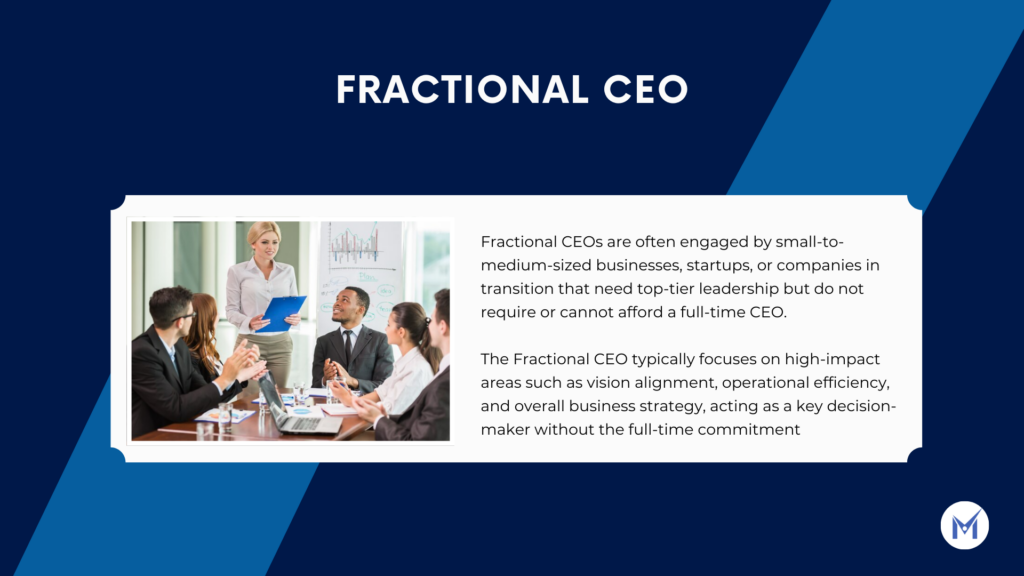
Skills and Experience Required
To be effective, a Fractional CEO must have significant experience in senior leadership roles, ideally with a background as a full-time CEO or executive leader. They should possess strong strategic thinking abilities, a track record of driving growth, and expertise in managing cross-functional teams. Additionally, they should have excellent communication and interpersonal skills to quickly integrate with existing teams and stakeholders. In high-stakes environments, a Fractional CEO must also demonstrate adaptability, as they may need to step into various industries and business models with agility. Experience in change management, financial oversight, and market expansion are also key assets for this role, as these are often core areas of focus in fractional engagements.
The ideal candidates for Fractional CEO roles are typically individuals who have served as CEOs or senior executives and are now looking for more flexibility, such as semi-retired professionals, former startup founders, or experienced executives interested in consulting. These professionals often bring a wealth of knowledge from working across various sectors, enabling them to adapt quickly to the needs of different businesses.
Structuring a Fractional CEO Engagement
When structuring a Fractional CEO engagement, it’s essential to clarify the scope, expectations, and goals from the outset. This includes defining the time commitment, which can range from a few days per week to several hours each month, depending on the company’s needs. Many fractional CEOs offer their services on a retainer basis, with flexible terms that can scale up or down as the business evolves. The duration of engagements can vary widely—from a few months for specific projects to longer-term arrangements for ongoing support.
Pricing for Fractional CEO services generally depends on the company’s size, industry, and the complexity of the role. Fees typically range from $10,000 to $25,000 per month, although rates can be higher for larger businesses or more intensive engagements. This pricing often includes high-level strategic oversight, team leadership, and periodic updates with the board or other stakeholders. Fractional CEOs can also structure pricing based on deliverables, such as the successful completion of a specific project or achievement of certain business milestones.
Deliverables in a Fractional CEO engagement may include:
- Strategic Plan – A detailed roadmap outlining the company’s goals, key initiatives, and success metrics.
- Operational Review – An assessment of current operations, with recommendations for improving efficiency, reducing costs, or enhancing productivity.
- Leadership Development – Guidance and mentorship for the existing leadership team to ensure alignment with company goals and improve overall management capabilities.
- Financial Oversight – Financial analysis and budget planning to support sustainable growth and profitability.
- Progress Reports – Regular updates on business performance, key challenges, and actionable recommendations for the board and other stakeholders.
Real-World Example
A notable example of the Fractional CEO model in action is Steve Blank, a seasoned entrepreneur and academic who has provided fractional CEO services to several tech startups. He has helped guide these companies through crucial stages, such as product development, go-to-market strategy, and scaling operations, leveraging his experience and expertise in the tech industry. By stepping into these roles on a fractional basis, Blank has been able to deliver high-impact guidance without the need for a long-term, full-time commitment, allowing him to work with multiple organizations and make a substantial difference in each.
For companies looking to engage a Fractional CEO, this model offers access to a level of executive talent that can drive meaningful transformation, even with limited resources. Fractional CEOs bring the experience, strategic vision, and leadership required to navigate complex challenges and set businesses on a path to growth, making them a highly valuable asset to organizations in need of temporary but powerful leadership.
Fractional CFO: An Overview
A Fractional CFO (Chief Financial Officer) provides strategic financial leadership and expertise on a part-time or project basis, often working with small-to-medium-sized businesses, startups, or organizations undergoing growth or transition. Fractional CFOs handle key responsibilities such as financial planning, budgeting, cash flow management, and financial reporting, helping companies make informed decisions that support sustainable growth. They offer businesses the high-level financial oversight of a full-time CFO without the significant costs associated with hiring one permanently. By engaging a Fractional CFO, companies can access specialized financial skills that are crucial for improving financial health and achieving long-term goals.

Skills and Experience Required
The role of a Fractional CFO demands a strong background in financial management and strategic planning. Ideal candidates typically have extensive experience in senior financial roles, including previous positions as a CFO, finance director, or controller. Essential skills include expertise in financial analysis, forecasting, budgeting, and risk management. A Fractional CFO should also be adept at cash flow management and familiar with compliance and regulatory requirements relevant to the industries they serve. Additionally, strong communication and leadership skills are crucial, as Fractional CFOs often interact with the executive team and board of directors to present financial insights and recommendations.
Ideal candidates for Fractional CFO roles are experienced finance professionals who may be semi-retired, former CFOs looking for flexible consulting opportunities, or seasoned financial managers who want to diversify their careers. Professionals who are detail-oriented, strategic thinkers, and effective communicators can thrive as Fractional CFOs, as they need to distill complex financial information into actionable insights for clients.
Structuring a Fractional CFO Engagement
When structuring a Fractional CFO engagement, it’s essential to clarify the scope of work, time commitment, and desired outcomes. Many Fractional CFOs work on a retainer basis, which provides flexibility for both the client and the consultant. The engagement might involve working on-site or remotely for a set number of hours per week or month, depending on the company’s needs. The duration of engagements can vary from short-term projects focused on specific issues, such as cash flow optimization, to long-term arrangements for ongoing financial leadership.
Pricing for Fractional CFO services depends on the scope and complexity of the financial needs. Generally, fees range from $8,000 to $20,000 per month, though this can vary based on the industry and the level of expertise required. Hourly rates can also apply, typically ranging from $200 to $500 per hour for specialized financial analysis or strategic planning tasks.
Deliverables in a Fractional CFO engagement often include:
- Financial Health Assessment – An analysis of the company’s current financial situation, including strengths, weaknesses, and opportunities for improvement.
- Financial Planning and Forecasting – Development of a comprehensive financial plan that includes budgeting, cash flow projections, and scenario planning.
- Cost Management and Optimization – Identification of cost-saving opportunities and strategies to improve profitability.
- Investor Relations and Fundraising Support – Guidance on fundraising strategies, preparation of financial documents for investors, and communication with stakeholders.
- Financial Reporting and Compliance – Ensuring that financial reporting is accurate, timely, and compliant with relevant regulations.
Real-World Example
One example of a successful Fractional CFO engagement is the case of The Honest Company, where a Fractional CFO helped the company prepare for its initial public offering (IPO). With extensive experience in guiding companies through IPO processes, the Fractional CFO provided the strategic oversight necessary for meeting financial regulatory requirements, preparing accurate financial statements, and ensuring a smooth transition to a public company. This example illustrates the impact a Fractional CFO can have on a business during a crucial phase, delivering significant value without the long-term commitment of a full-time role.
Engaging a Fractional CFO enables businesses to benefit from high-caliber financial leadership tailored to their specific needs. For companies that require financial expertise to guide critical decisions but don’t have the resources for a full-time CFO, a fractional model offers a flexible, cost-effective solution. Fractional CFOs bring insights, discipline, and strategic direction to help companies manage financial risks, optimize resources, and position themselves for future success.
Fractional CMO: An Overview
A Fractional CMO (Chief Marketing Officer) provides part-time or project-based marketing leadership and strategic direction to businesses. This role is ideal for companies that need top-level marketing expertise but do not require or have the resources for a full-time CMO. Fractional CMOs focus on developing and executing marketing strategies that drive growth, improve brand positioning, and optimize customer acquisition and retention efforts. They are often engaged to guide specific marketing initiatives, such as launching new products, entering new markets, or overseeing digital transformation in marketing.

Skills and Experience Required
To be effective, a Fractional CMO should have extensive experience in senior marketing roles, ideally with a background as a full-time CMO or VP of Marketing. Key skills include expertise in digital marketing, branding, content strategy, and data analytics. Additionally, they should have a strong understanding of various marketing channels—such as social media, email, search engine optimization (SEO), and paid advertising—and the ability to align these channels with business objectives. A successful Fractional CMO should also have excellent leadership and communication skills, as they will need to manage teams, collaborate with other executives, and present strategies and results to stakeholders.
Ideal candidates for Fractional CMO roles are seasoned marketing professionals who have held leadership positions and are looking for flexible, consulting-based roles. These individuals may include semi-retired executives, former startup founders, or marketing directors who are ready to leverage their skills across multiple businesses. They thrive in environments where they can bring fresh insights to diverse marketing challenges and help businesses grow without committing to a full-time position.
Structuring a Fractional CMO Engagement
Structuring a Fractional CMO engagement typically involves defining the scope of work, time commitment, and goals. Fractional CMOs often work on a retainer or project basis, with engagements that range from a few days a week to several hours each month, depending on the client’s needs. Many Fractional CMOs provide flexibility, allowing clients to scale up or down based on their requirements.
Pricing for Fractional CMO services can vary significantly depending on the scope and complexity of the engagement. Monthly retainers are common, with fees ranging from $8,000 to $20,000, although they can be higher for larger projects or intensive roles. Hourly rates typically range from $200 to $400 per hour, depending on the CMO’s level of expertise and the market demands.
Deliverables for a Fractional CMO engagement generally include:
- Marketing Strategy Development – A comprehensive marketing plan that aligns with the company’s business goals and defines key initiatives for growth.
- Brand Positioning and Messaging – Developing and refining the company’s brand identity, messaging, and tone to ensure consistency across all marketing channels.
- Customer Acquisition and Retention Plan – Strategies for attracting new customers, improving customer engagement, and increasing retention.
- Channel Optimization – Assessment and optimization of various marketing channels, including social media, SEO, email, and paid advertising, to maximize ROI.
- Performance Metrics and Reporting – Regular updates on marketing performance, including key metrics such as customer acquisition costs, lifetime value, and return on ad spend.
Real-World Example
One example of a successful Fractional CMO engagement is HubSpot’s approach to inbound marketing, which was driven by a Fractional CMO during its early stages. By focusing on content marketing, SEO, and customer education, the Fractional CMO helped HubSpot build a strong online presence and establish itself as a leader in inbound marketing. This strategy not only attracted new customers but also laid the foundation for the company’s long-term growth and brand positioning.
Engaging a Fractional CMO allows businesses to access strategic marketing leadership tailored to their unique needs and budgets. This model is particularly beneficial for startups and growing companies that need to enhance their marketing capabilities but are not yet ready for a full-time CMO. Fractional CMOs bring targeted expertise, fresh perspectives, and the ability to implement impactful strategies quickly, making them invaluable assets for companies aiming to scale their marketing efforts.
Fractional CSO: An Overview
A Fractional CSO (Chief Sales Officer) provides part-time or project-based leadership in sales strategy and execution, helping companies build and optimize their sales operations. This role is particularly valuable for businesses seeking to drive revenue growth, improve sales performance, and develop a scalable sales infrastructure. Fractional CSOs work closely with sales teams, offering guidance on sales strategy, lead generation, pipeline management, and customer relationship management. They bring expertise in structuring sales processes, implementing CRM systems, and aligning sales activities with overall business objectives, without the need for a full-time hire.
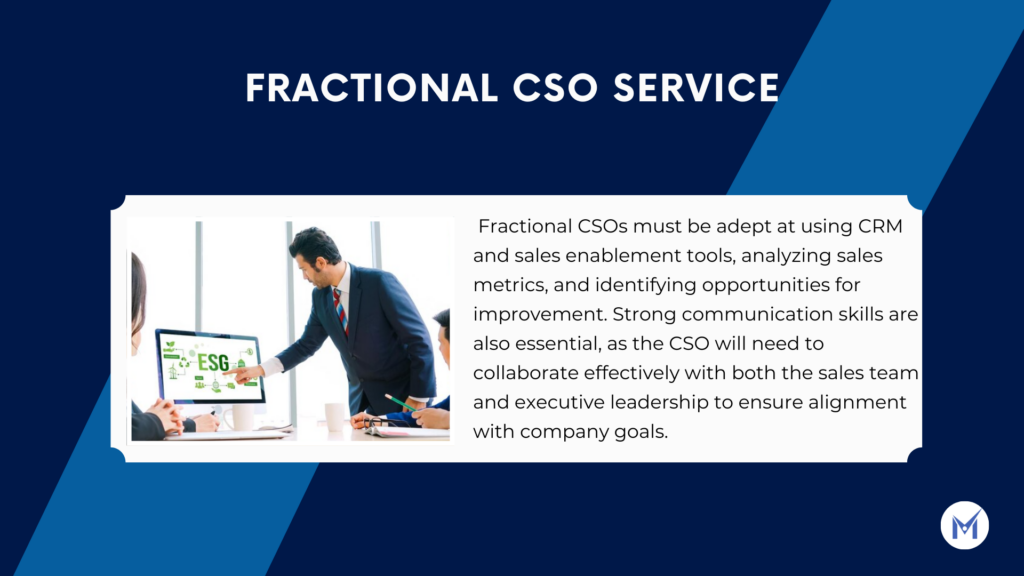
Skills and Experience Required
A successful Fractional CSO typically has extensive experience in senior sales roles, such as a full-time CSO, VP of Sales, or Sales Director. Key skills include a deep understanding of sales strategy, team leadership, and data-driven decision-making. Fractional CSOs must be adept at using CRM and sales enablement tools, analyzing sales metrics, and identifying opportunities for improvement. Strong communication skills are also essential, as the CSO will need to collaborate effectively with both the sales team and executive leadership to ensure alignment with company goals.
Ideal candidates for Fractional CSO roles are experienced sales professionals who want to offer their expertise on a flexible, consulting basis. This includes semi-retired executives, sales leaders who have successfully scaled sales teams, or those with a background in consulting. Individuals with a strong track record in building and optimizing sales functions, and who can quickly adapt to new industries, are particularly well-suited for fractional CSO roles.
Structuring a Fractional CSO Engagement
When structuring a Fractional CSO engagement, it’s essential to define the scope, duration, and goals of the engagement from the start. Many Fractional CSOs work on a retainer basis or under a project-based agreement. The engagement can range from a few days per month to a more intensive, short-term arrangement focused on specific objectives, such as launching a new product or entering a new market.
Pricing for Fractional CSO services generally ranges from $10,000 to $25,000 per month, depending on the company’s needs and the scope of the role. For project-based engagements, fees may be structured as a one-time cost, depending on deliverables and timelines. Hourly rates for fractional CSO services typically range from $200 to $400 per hour, depending on the complexity and industry.
Deliverables in a Fractional CSO engagement may include:
- Sales Strategy Development – A comprehensive sales strategy that aligns with business goals, including target market identification, value propositions, and sales messaging.
- Sales Process Optimization – An evaluation and enhancement of existing sales processes, including lead generation, qualification, and closing techniques.
- Sales Team Training and Development – Workshops or training sessions to improve sales team performance, focusing on areas such as effective communication, objection handling, and closing techniques.
- Pipeline Management and CRM Implementation – Implementation or optimization of CRM systems to track sales activities, manage leads, and improve forecasting accuracy.
- Performance Metrics and Reporting – Regular reports on key sales metrics, such as conversion rates, sales cycle length, and customer acquisition costs, along with actionable insights for improvement.
Real-World Example
A prime example of a successful Fractional CSO engagement is Larry Linne, who has served as a Fractional CSO for multiple companies, helping them develop and implement high-impact sales strategies. By focusing on areas like customer segmentation, sales forecasting, and sales enablement, Linne has helped businesses achieve rapid growth and streamline their sales operations. His approach often involves working directly with sales teams to identify bottlenecks, refine sales techniques, and enhance overall team effectiveness, demonstrating the tangible value that a Fractional CSO can bring to an organization.
By engaging a Fractional CSO, companies gain access to strategic sales leadership that drives revenue growth and improves sales efficiency. This model is particularly beneficial for businesses that need to strengthen their sales function but do not require a full-time CSO. Fractional CSOs offer the flexibility and expertise needed to achieve sales goals in a cost-effective manner, making them an invaluable resource for companies aiming to scale their sales efforts successfully.
Fractional CTO: An Overview
A Fractional CTO (Chief Technology Officer) provides part-time or project-based leadership in technology strategy and implementation, helping companies develop and manage their technology infrastructure. Fractional CTOs are often engaged by startups, growing companies, or businesses undergoing digital transformation that need expert guidance but do not require a full-time CTO. The role focuses on aligning technology initiatives with business goals, managing tech teams, and implementing technology solutions that drive innovation, efficiency, and scalability.
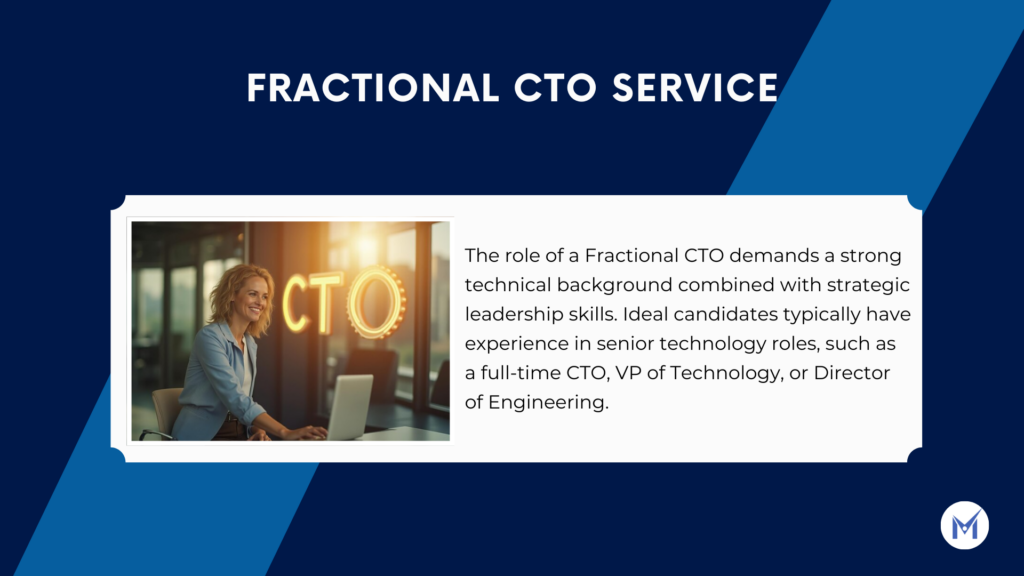
Skills and Experience Required
The role of a Fractional CTO demands a strong technical background combined with strategic leadership skills. Ideal candidates typically have experience in senior technology roles, such as a full-time CTO, VP of Technology, or Director of Engineering. They should possess expertise in areas like software development, systems architecture, cybersecurity, and cloud computing. Additionally, a Fractional CTO should be familiar with emerging technologies and adept at digital transformation, as many engagements involve helping businesses leverage technology for competitive advantage. Strong project management, leadership, and communication skills are essential, as the CTO must guide tech teams and collaborate with other executives to integrate technology solutions that support business objectives.
Ideal candidates for Fractional CTO roles are seasoned technology professionals with a proven track record in leading tech teams and managing complex projects. These individuals may include semi-retired tech leaders, former startup founders, or experienced IT consultants looking to diversify their client base. Professionals who excel at identifying and implementing tech solutions, managing digital projects, and translating business needs into technology strategies are well-suited for this role.
Structuring a Fractional CTO Engagement
Structuring a Fractional CTO engagement involves defining the scope of work, time commitment, and desired outcomes. Fractional CTOs often work on a retainer or project basis, depending on the needs of the client. The engagement might range from a few hours per week to more intensive, short-term projects focused on specific goals, such as launching a new platform or overseeing a digital transformation. The engagement can be tailored to be flexible, allowing businesses to scale support up or down as required.
Pricing for Fractional CTO services varies widely based on the complexity of the role and the industry. Monthly retainers typically range from $12,000 to $25,000, while project-based engagements may be priced based on the scope and deliverables. Hourly rates for fractional CTOs generally fall between $200 and $500 per hour, depending on the depth of expertise required.
Deliverables in a Fractional CTO engagement often include:
- Technology Roadmap – A strategic plan that outlines technology goals, priorities, and timelines aligned with business objectives.
- Systems Architecture and Infrastructure – Design and implementation of scalable systems architecture that supports the company’s growth and operational needs.
- Technology Stack Assessment – Evaluation and optimization of the current technology stack, including software, hardware, and cloud solutions, to improve efficiency and reduce costs.
- Digital Transformation Strategy – Guidance on adopting digital tools and technologies to streamline operations, improve customer experiences, and enhance competitiveness.
- Cybersecurity and Risk Management – Implementation of cybersecurity protocols and risk management strategies to protect company data and maintain regulatory compliance.
Real-World Example
A notable example of the Fractional CTO model is Guy Kawasaki’s work with Canva. While not strictly a CTO role, Kawasaki served as Canva’s “Chief Evangelist” on a fractional basis, providing technology and strategic guidance as the company scaled its platform. Through his expertise, he helped Canva refine its technology stack and improve user experience, contributing to the company’s rapid growth and success. In a similar vein, Fractional CTOs can provide crucial guidance and oversight, helping companies deploy tech solutions effectively without the need for a full-time executive.
Engaging a Fractional CTO allows businesses to access top-tier technology leadership on a flexible basis, making it easier to manage complex tech projects, enhance cybersecurity, and implement scalable tech infrastructure. This model is particularly beneficial for companies looking to modernize their technology stack, drive digital transformation, or explore new technology-driven growth opportunities. Fractional CTOs bring the experience and insight needed to harness technology for long-term success while allowing companies to manage costs and adapt to changing needs.
Fractional CIO: An Overview
A Fractional CIO (Chief Information Officer) provides part-time or project-based leadership in information technology (IT) strategy, helping businesses manage their IT infrastructure, optimize operations, and leverage technology for competitive advantage. Fractional CIOs are commonly engaged by organizations that need high-level IT guidance but do not require a full-time CIO. They play a pivotal role in aligning IT initiatives with business goals, implementing technology solutions, and ensuring cybersecurity and data management practices are robust and compliant. Fractional CIOs offer strategic oversight and operational expertise, helping businesses maximize their IT investments while maintaining flexibility.

Skills and Experience Required
A successful Fractional CIO requires a solid foundation in IT management and strategic planning. Typically, candidates have extensive experience in senior IT roles, such as a full-time CIO, IT Director, or VP of IT. Key skills include expertise in IT infrastructure, systems integration, cybersecurity, and digital transformation. Fractional CIOs must also be adept at IT governance, risk management, and compliance, as they often play a role in ensuring the organization meets regulatory standards. Strong leadership, project management, and communication skills are essential, as the CIO must work closely with other executives and departments to align IT with overall business strategy.
Ideal candidates for Fractional CIO roles include seasoned IT professionals looking to offer their expertise on a consulting basis. This might include semi-retired CIOs, former technology directors, or experienced IT consultants. Fractional CIOs should have a strategic mindset, with the ability to identify how technology can drive business goals and deliver measurable results. Individuals who excel at navigating complex IT challenges and fostering innovation within organizations are particularly well-suited for this role.
Structuring a Fractional CIO Engagement
When structuring a Fractional CIO engagement, it’s important to define the scope, time commitment, and desired outcomes. Fractional CIOs often work on a retainer basis or are engaged for specific projects, such as leading digital transformation initiatives, overseeing IT infrastructure upgrades, or establishing cybersecurity protocols. These engagements might range from a few hours per week to several days per month, depending on the client’s needs and the complexity of the tasks involved.
Pricing for Fractional CIO services varies widely based on the level of expertise required and the scope of the engagement. Monthly retainers can range from $10,000 to $25,000, while project-based engagements may carry a one-time fee or be billed at hourly rates, typically $200 to $500 per hour. The flexibility of fractional engagements allows businesses to tailor the level of CIO support to their specific requirements, making it a cost-effective solution.
Deliverables for a Fractional CIO engagement often include:
- IT Strategy Development – Creation of an IT roadmap that aligns with the company’s business goals, including technology priorities and timelines.
- Infrastructure Assessment and Optimization – Evaluation of the current IT infrastructure, with recommendations for upgrades, optimizations, or cost-saving opportunities.
- Cybersecurity and Compliance – Implementation of cybersecurity protocols and ensuring compliance with relevant data protection regulations, such as GDPR or CCPA.
- Vendor Management and Systems Integration – Oversight of vendor relationships and integration of third-party systems to ensure seamless IT operations.
- Digital Transformation Guidance – Support for adopting new digital tools and technologies that enhance productivity, customer experience, and operational efficiency.
Real-World Example
An example of a successful Fractional CIO engagement is T-Mobile’s digital transformation, which involved fractional IT leadership during its transition to a digital-first approach. With fractional leadership guiding the adoption of advanced IT solutions and enhancing cybersecurity measures, T-Mobile was able to improve its infrastructure, streamline operations, and better serve its customers. Fractional CIOs can similarly offer targeted expertise to help businesses implement complex IT initiatives without the commitment or cost of a full-time executive.
Engaging a Fractional CIO allows businesses to access top-tier IT leadership on a flexible basis, which is particularly valuable for companies looking to modernize their technology, ensure compliance, or enhance cybersecurity. This model provides a strategic advantage by bringing in specialized expertise when needed, making it an ideal solution for companies that need high-level IT guidance but not on a full-time basis. Fractional CIOs help organizations leverage technology to support business goals, manage risks, and drive innovation, delivering significant value while keeping costs manageable.
Fractional CPO: An Overview
A Fractional CPO (Chief Product Officer) provides part-time or project-based leadership in product strategy, development, and management. Fractional CPOs are engaged by organizations that need top-level product expertise but do not require a full-time CPO. This role is particularly valuable for startups, growing companies, or businesses launching new products, as Fractional CPOs help align product strategy with business goals, oversee product development processes, and optimize product-market fit. By leveraging the expertise of a Fractional CPO, companies can make strategic decisions about their product offerings while maintaining flexibility and controlling costs.
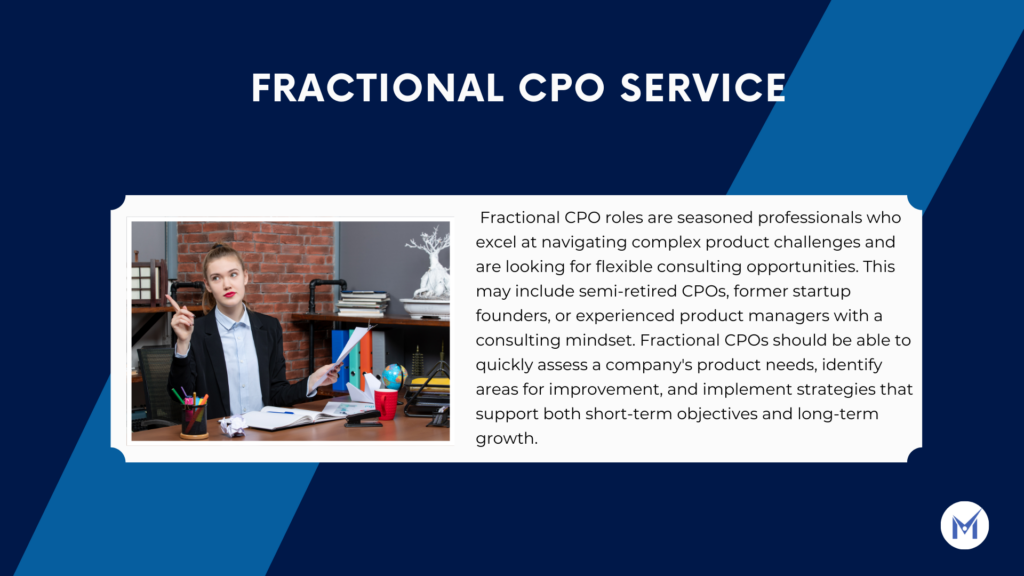
Skills and Experience Required
Fractional CPOs are typically experienced product leaders with a strong background in product management, strategy, and development. Ideal candidates have held senior roles such as CPO, Head of Product, or Product Director, and have experience in leading cross-functional teams, setting product roadmaps, and launching successful products. Key skills include a deep understanding of product lifecycle management, market research, user experience (UX) design, and data analytics. A Fractional CPO should also possess strong strategic thinking, leadership, and communication skills, as they need to collaborate effectively with executives, product teams, and stakeholders to drive product innovation and market success.
Ideal candidates for Fractional CPO roles are seasoned professionals who excel at navigating complex product challenges and are looking for flexible consulting opportunities. This may include semi-retired CPOs, former startup founders, or experienced product managers with a consulting mindset. Fractional CPOs should be able to quickly assess a company’s product needs, identify areas for improvement, and implement strategies that support both short-term objectives and long-term growth.
Structuring a Fractional CPO Engagement
Structuring a Fractional CPO engagement involves defining the scope, time commitment, and objectives from the outset. Fractional CPOs often work on a retainer or project-based basis, allowing for flexibility to address specific product needs. Engagements may range from a few hours per week for ongoing product strategy support to more intensive arrangements focused on launching a new product or entering a new market.
Pricing for Fractional CPO services typically ranges from $12,000 to $30,000 per month, depending on the complexity and scale of the role. For project-based engagements, fees may be structured as a one-time cost or based on hourly rates, generally $200 to $500 per hour, depending on expertise and industry requirements
Deliverables in a Fractional CPO engagement often include:
- Product Strategy Development – A comprehensive product roadmap that outlines key priorities, timelines, and metrics for success.
- Market Research and Product-Market Fit Analysis – Research and analysis to ensure the product aligns with market demands, identifying target segments and competitive positioning.
- Product Roadmap and Feature Prioritization – Development of a detailed product roadmap, including prioritization of features based on customer needs, business goals, and market trends.
- User Experience (UX) Optimization – Recommendations for improving UX design and user interfaces to enhance customer satisfaction and engagement.
Cross-functional Team Alignment – Coordination with marketing, sales, engineering, and design teams to ensure product goals align with broader business objectives and are executed effectively.
Real-World Example
A real-world example of a Fractional CPO engagement is Marty Cagan’s work with various technology companies. As a prominent figure in product management, Cagan has offered his expertise on a fractional basis to help companies like Google and eBay develop and refine their product strategies. By providing insights into product development and market fit, he has helped these companies launch successful products that resonate with their target audiences. Fractional CPOs, like Cagan, bring a level of expertise and strategic focus that can make a substantial difference in a company’s product trajectory, without requiring a full-time commitment.
Engaging a Fractional CPO allows businesses to access specialized product leadership on a flexible basis, making it an ideal solution for companies looking to enhance their product strategy, refine their offerings, or accelerate product innovation. Fractional CPOs deliver significant value by helping businesses navigate complex product challenges, optimize resources, and align their product initiatives with their long-term vision. This model enables companies to benefit from high-level product expertise tailored to their unique needs and goals.
Fractional COO: An Overview
A Fractional COO (Chief Operating Officer) provides part-time or project-based leadership in operations, helping companies streamline processes, improve efficiency, and align operational activities with strategic goals. Fractional COOs are often engaged by startups, growing businesses, or companies undergoing restructuring that need high-level operational guidance without committing to a full-time COO role. The Fractional COO focuses on optimizing day-to-day operations, enhancing productivity, and ensuring that the company’s operational framework supports overall business objectives.
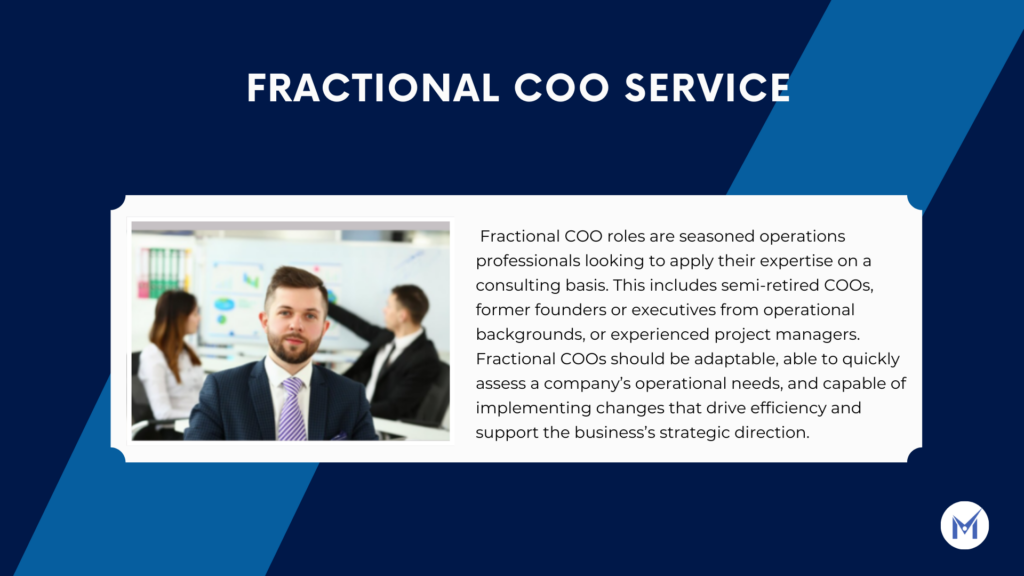
Skills and Experience Required
The role of a Fractional COO requires significant experience in operational management and strategic planning. Ideal candidates have held senior roles such as full-time COO, VP of Operations, or Operations Director. Key skills include expertise in process optimization, supply chain management, and project management. A Fractional COO should also have a strong understanding of financial management, as they often work closely with the CFO to manage budgets and optimize resource allocation. Additionally, they need excellent leadership and communication skills to effectively oversee teams, implement operational strategies, and work collaboratively with other executives.
Ideal candidates for Fractional COO roles are seasoned operations professionals looking to apply their expertise on a consulting basis. This includes semi-retired COOs, former founders or executives from operational backgrounds, or experienced project managers. Fractional COOs should be adaptable, able to quickly assess a company’s operational needs, and capable of implementing changes that drive efficiency and support the business’s strategic direction.
Structuring a Fractional COO Engagement
A Fractional COO engagement is typically structured around a clear set of objectives, time commitment, and deliverables. Fractional COOs often work on a retainer basis or are hired for specific projects, such as launching new operational processes, optimizing supply chains, or managing a business expansion. Engagements can range from a few days per month to more intensive periods, depending on the organization’s needs.
Pricing for Fractional COO services varies based on the scope of work and industry. Monthly retainers generally range from $10,000 to $30,000, though costs can be higher for complex projects or larger companies. Hourly rates can also apply, typically ranging from $200 to $500 per hour, depending on the level of expertise required and the intensity of the engagement.
Deliverables in a Fractional COO engagement may include:
- Operational Assessment – An evaluation of current operational processes, with recommendations for improvements and potential cost savings.
- Process Optimization and Efficiency Plans – Development and implementation of streamlined processes to enhance productivity, reduce waste, and optimize resources.
- Resource Allocation and Budget Management – Oversight of budget allocation and resource management to ensure operational activities align with financial goals.
- Team Development and Leadership Training – Training sessions and workshops aimed at developing leadership skills and improving team collaboration within the operations department.
- Performance Metrics and Reporting – Establishing key performance indicators (KPIs) and regular reports to track operational efficiency, productivity, and overall business performance.
Real-World Example
A notable example of the Fractional COO model is John Rossman’s role with various e-commerce and retail businesses. As a former executive at Amazon, Rossman has offered fractional COO services to help companies optimize their operations and adopt Amazon’s high-efficiency practices. By bringing his expertise in process optimization and supply chain management, he has helped businesses improve their logistics, reduce costs, and enhance overall operational performance. Fractional COOs like Rossman can make substantial improvements to a company’s operations by applying best practices from industry leaders.
Engaging a Fractional COO allows businesses to access high-level operational expertise in a flexible manner, making it an ideal solution for companies looking to enhance their operational efficiency without a full-time commitment. Fractional COOs provide critical insights, optimize processes, and ensure that operations are aligned with the company’s strategic vision, delivering value through cost-effective leadership. This model enables businesses to achieve operational excellence and drive growth by leveraging experienced leadership on a scalable basis.
Fractional CRO: An Overview
A Fractional CRO (Chief Revenue Officer) provides part-time or project-based leadership focused on driving revenue growth and optimizing sales strategies. This role is particularly valuable for companies looking to accelerate growth, improve customer acquisition and retention, or expand into new markets. Fractional CROs bring their expertise in revenue strategy, sales optimization, and customer success management to businesses that need high-level oversight but do not require or cannot afford a full-time CRO. They work closely with sales, marketing, and customer success teams to align these functions and ensure they work cohesively to maximize revenue.

Skills and Experience Required
To be effective, a Fractional CRO should have a strong background in sales management, revenue strategy, and business development. Ideal candidates typically have held senior roles such as CRO, VP of Sales, or VP of Business Development, with experience in leading revenue growth initiatives, managing sales teams, and implementing revenue optimization strategies. Key skills include proficiency in sales analytics, understanding of customer lifecycle management, and expertise in building scalable sales processes. A successful Fractional CRO should also possess strong communication and leadership skills, as they often work cross-functionally to align teams around common revenue goals.
Ideal candidates for Fractional CRO roles are experienced sales and revenue leaders looking to apply their expertise in a flexible, consulting-based role. This can include semi-retired CROs, former startup founders with a sales background, or senior sales executives interested in consulting. Individuals who excel at data-driven decision-making, revenue forecasting, and aligning sales and marketing efforts are particularly well-suited for fractional CRO roles.
Structuring a Fractional CRO Engagement
When structuring a Fractional CRO engagement, it’s crucial to outline the specific objectives, time commitment, and desired outcomes. Fractional CROs often work on a retainer or project-based basis, depending on the needs of the business. Engagements can range from a few days per month for ongoing revenue strategy support to more intensive, short-term projects focused on launching new sales initiatives or entering new markets.
Pricing for Fractional CRO services generally depends on the company’s needs and the scope of the role. Monthly retainers typically range from $12,000 to $30,000, while project-based engagements may be priced as a one-time fee or on an hourly basis, generally $200 to $500 per hour, depending on expertise and industry demands.
Fractional Chief Security Officer (CSO): An Overview
A Fractional Chief Security Officer (CSO) provides part-time or project-based leadership in security strategy, helping companies protect their assets, ensure regulatory compliance, and manage security risks. Fractional CSOs are especially valuable for businesses that need high-level security expertise but do not require or cannot afford a full-time CSO. These executives oversee the development and implementation of security policies, monitor emerging threats, and ensure that the company’s data, systems, and infrastructure are secure. They work across physical, digital, and operational security domains, adapting to the unique needs of the organization to mitigate risks effectively.
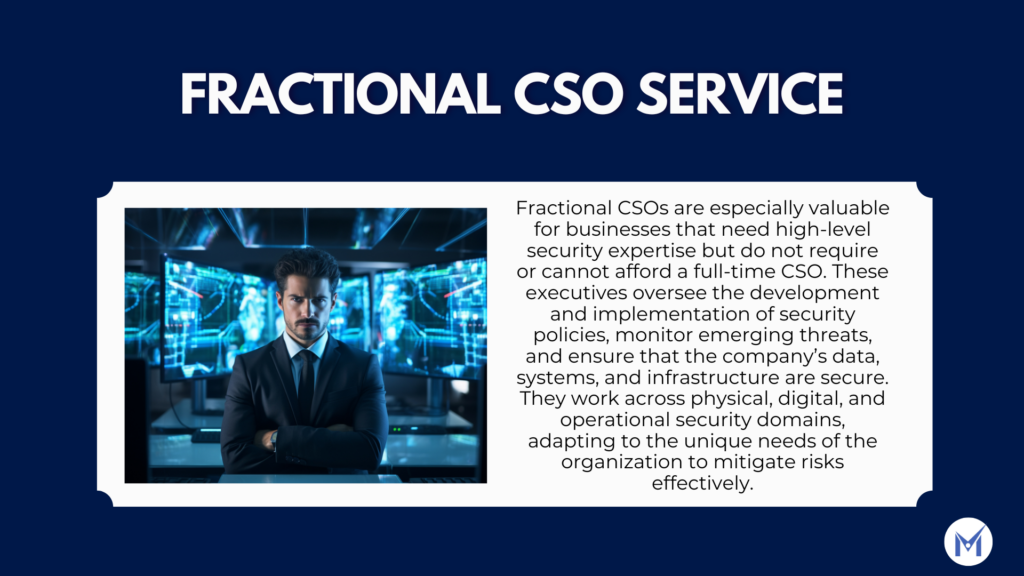
Skills and Experience Required
To be effective, a Fractional CSO must have extensive experience in security management and a deep understanding of risk assessment and mitigation. Ideal candidates often have backgrounds as full-time CSOs, CISOs (Chief Information Security Officers), or senior security directors, with expertise in cybersecurity, data protection, and regulatory compliance. They should possess strong analytical skills to identify potential vulnerabilities and strategic thinking abilities to develop comprehensive security strategies. Additionally, Fractional CSOs must be proficient in using security tools and frameworks, familiar with industry standards (e.g., ISO, NIST), and adept at incident response and crisis management.
Ideal candidates for Fractional CSO roles are seasoned security professionals who are either semi-retired or experienced security executives looking for flexible consulting work. Individuals with a strong track record in implementing security protocols, managing security operations, and handling compliance issues are well-suited for these roles. Fractional CSOs should also have excellent communication skills, as they often need to explain complex security concepts to non-technical stakeholders and work with other executives to align security initiatives with business objectives.
Structuring a Fractional CSO Engagement
Structuring a Fractional CSO engagement requires clear definition of the scope, objectives, and time commitment. Fractional CSOs typically work on a retainer or project basis, allowing for flexibility in addressing specific security challenges. Engagements might range from a few hours per week to more intensive, short-term projects focused on achieving certain security goals, such as establishing compliance or responding to a security breach.
Pricing for Fractional CSO services can vary widely based on the complexity of the role and the industry. Monthly retainers generally range from $10,000 to $25,000, though higher rates may apply for projects requiring specialized expertise or intensive commitment. Hourly rates for fractional CSOs generally fall between $200 to $500 per hour, depending on the scope and complexity of the work involved.
Deliverables in a Fractional CSO engagement often include:
- Security Risk Assessment – An evaluation of current security measures and identification of potential vulnerabilities, along with recommendations for improvements.
- Security Policy Development – Creation and implementation of security policies that align with industry standards and regulatory requirements.
- Incident Response Plan – Development of an actionable plan for responding to security incidents, including procedures for data breaches, cyber-attacks, and physical security threats.
- Compliance Management – Ensuring that the organization adheres to relevant regulations and industry standards, such as GDPR, HIPAA, or SOC 2.
- Security Awareness Training – Conducting training sessions for employees to enhance their understanding of security risks and encourage best practices.
Real-World Example
A notable example of the Fractional CSO model is Gary Hayslip’s work with various companies in the technology and healthcare sectors. As a seasoned security executive, Hayslip has provided fractional security leadership, helping companies implement robust cybersecurity frameworks and ensuring compliance with data protection regulations. By offering his expertise on a flexible basis, Hayslip has helped organizations safeguard their systems and data without the need for a full-time CSO, demonstrating the effectiveness of the fractional model in delivering high-level security leadership.
Engaging a Fractional CSO allows businesses to access strategic security expertise in a cost-effective manner, making it an ideal solution for organizations that need to strengthen their security posture but cannot justify a full-time hire. Fractional CSOs provide essential guidance in managing security risks, protecting sensitive information, and ensuring compliance, enabling businesses to focus on growth while maintaining a secure operational environment. By addressing the specific security needs of each client, Fractional CSOs help organizations navigate complex security challenges with confidence.
The article “Fractional CXOs – Complete Guide” explores the growing trend of fractional executive roles, highlighting how businesses can benefit from engaging part-time or project-based leaders in key areas like operations, finance, technology, sales, and security. Fractional CXOs provide high-level expertise tailored to specific needs without the commitment of a full-time hire. This guide covers roles such as Fractional CEO, CFO, CMO, CTO, CSO, and others, detailing the skills required, structuring engagements, pricing, and potential deliverables
Fractional CXOs are ideal for startups, SMEs, and companies in transition, offering flexibility and access to top-tier leadership. These roles enable businesses to navigate challenges like digital transformation, growth, or market expansion with strategic insight and minimal financial risk. Each fractional role provides specialized guidance, such as a Fractional CFO’s financial planning, a Fractional CSO’s security management, or a Fractional CRO’s revenue optimization, helping businesses align specific functions with broader goals.
For professionals looking to offer fractional services, platforms like Minutly facilitate the process by enabling the creation of a service catalog. Through Minutly, experts can showcase their services, clearly outline offerings, and connect with potential clients. Minutly’s platform helps fractional executives structure their service catalog, making it easier for clients to understand their value proposition and engage the right expertise for their needs. With Minutly, fractional CXOs can effectively grow their consulting businesses and provide high-impact services to companies in need of flexible executive leadership.



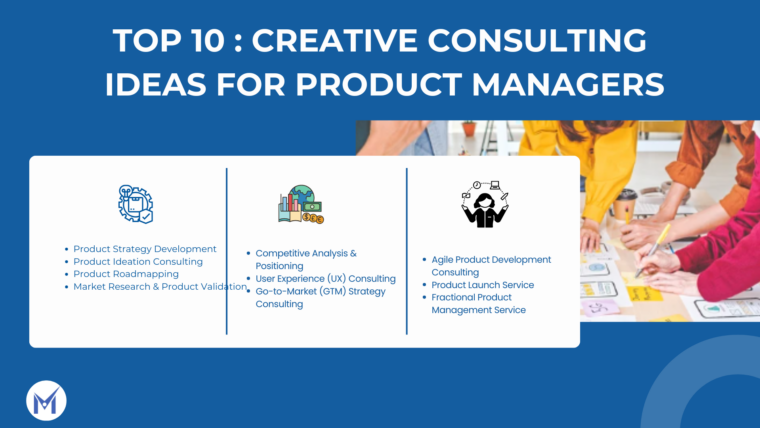
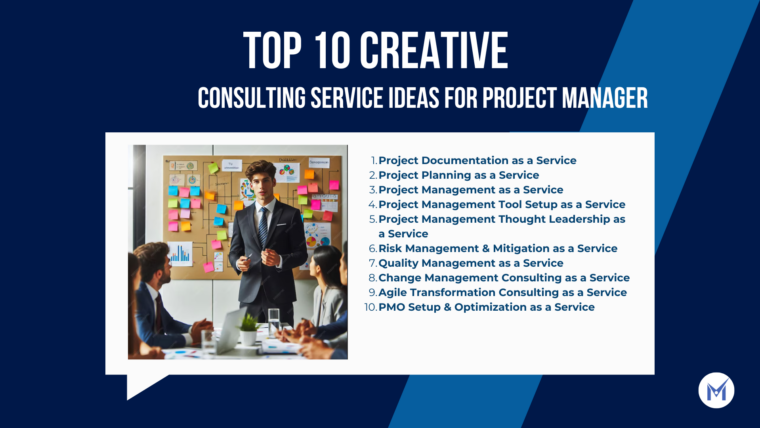


50+ Website features that makes running a business easier
Top 10 essential features for a SaaS website
How to start a Generative AI Service: A Comprehensive Guide (2024)
What is a Service Catalog?
What is a Service Catalog?
Top 10 Essential Sales Service Requests Every Business Should Offer
Sharing your Minutly Catalog
Setting up your catalog